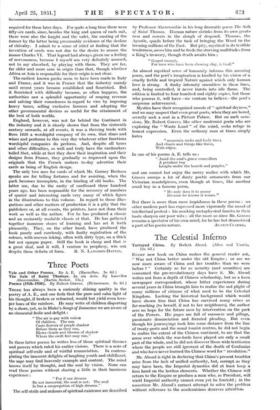The Celestial Inferno
EVERY new book on China makes the general reader ask, " Was not China better under the old Empire ; or are we now more aware of China and her troubles than we were before ? " Certainly so far as security (and securities) are concerned the pre-revolutionary days have it. Mr. Abend writes not from a depth of Chinese scholarship, but as a keen newspaper correspondent, whose bitter experiences during several years in China brought him to realize the sad plight of many millions of citizens of what used to be the Celestial Kingdom. Lacking the historical background which would have shown him that China has survived many crises as far-reaching (to herself, if not to her neighbours), the author sees no hope for the future save by intervention on the part of the Powers. His pages are full of massacre and pillage, passionate denunciation and frenzied pleading. But even though his journeyings took him some distance from the line of treaty-ports and the usual tourist centres, he did not begin to realize the extent of the Chinese continent, to see that the areas over which the war-lords have played are only a small part of the whole, and he did not discover those wide territories where the people are still ignorant of the death of Confucius and who have never learned the Chinese word for " revolution."
Mr. Abend is right in declaring that China's present troubles arise from the lack of unified authority, but, corrupt as they may have been, the Imperial dynasties did at least keep a firm hand on the lawless elements. Whether the Chinese will return to the Empire or produce a man who, as President, will wield Imperial authority cannot even yet be foretold ; in the meantime Mr. Abend's earnest attempt to solve the problem without reference to the academicians deserves attention.






































 Previous page
Previous page